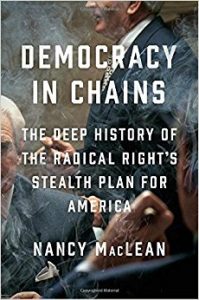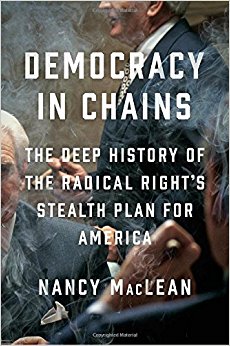
By George Monbiot
The Guardian (7/19/17)
It’s the missing chapter: a key to understanding the politics of the past half century. To read Nancy MacLean’s new book, Democracy in Chains: The Deep History of the Radical Right’s Stealth Plan for America, is to see what was previously invisible.
The history professor’s work on the subject began by accident. In 2013 she stumbled across a deserted clapboard house on the campus of George Mason University in Virginia. It was stuffed with the unsorted archives of a man who had died that year whose name is probably unfamiliar to you: James McGill Buchanan. She says the first thing she picked up was a stack of confidential letters concerning millions of dollars transferred to the university by the billionaire Charles Koch.
Her discoveries in that house of horrors reveal how Buchanan, in collaboration with business tycoons and the institutes they founded, developed a hidden programme for suppressing democracy on behalf of the very rich. The programme is now reshaping politics, and not just in the US.
Buchanan saw stealth as crucial. He told his collaborators that “conspiratorial secrecy is at all times essential”. Instead of revealing their ultimate destination, they would proceed by incremental steps.
Buchanan was strongly influenced by both the neoliberalism of Friedrich Hayek and Ludwig von Mises, and the property supremacism of John C Calhoun, who argued in the first half of the 19th century that freedom consists of the absolute right to use your property (including your slaves) however you may wish; any institution that impinges on this right is an agent of oppression, exploiting men of property on behalf of the undeserving masses.
Defending freedom only for the wealthy few
James Buchanan brought these influences together to create what he called public choice theory. He argued that a society could not be considered free unless every citizen has the right to veto its decisions. What he meant by this was that no one should be taxed against their will. But the rich were being exploited by people who use their votes to demand money that others have earned, through involuntary taxes to support public spending and welfare. Allowing workers to form trade unions and imposing graduated income taxes were forms of “differential or discriminatory legislation” against the owners of capital.
Any clash between “freedom” (allowing the rich to do as they wish) and democracy should be resolved in favour of freedom. In his book The Limits of Liberty, he noted that “despotism may be the only organisational alternative to the political structure that we observe.” Despotism in defence of freedom. …
*****
New Book On Rise Of The American Right Has Libertarians Riled
By Marc Parry
The Chronicle of Higher Education (7/19/17)
Polemical books often provoke a strong response. But the argument over a new intellectual history of the right has played out with unusual intensity. A phalanx of largely libertarian critics has waged an online battle against the Duke University historian who wrote the book, Nancy MacLean, accusing her of scholarly misdeeds so egregious that she should be stripped of tenure, fired, and perhaps sued. MacLean’s sympathizers have also quickly dug in, branding the criticism a Koch-backed smear campaign. Scholars on both sides manned their ramparts without actually reading the entire book.
The personal attacks have unnerved MacLean. In an email interview with The Chronicle Review, she described how supposed reviewers on Amazon recycled right-wing critiques of her book, sometimes in “crude terms.” Without her knowledge, someone put up a Wikipedia page about her featuring the attacks. One online commenter on Mises Wire, calling her a “rabid feminazi” and an “anti-Southerner,” posted information about her home. “It made me feel vulnerable and exposed (which may have been their intent),” she writes. As for the call to fire her, “Such rhetorical bullying would be laughable,” she says, “if it weren’t part of a pattern on the right of escalating attempts to intimidate scholars who disagree with them.”
“…this summer’s hottest pastime for libertarian-leaning academics.”
The response reflects the polemical charge of MacLean’s study, Democracy in Chains (Viking). A bumper crop of historians have investigated the history of the right over the past quarter century, often writing with empathy, but MacLean’s book is a different beast. From the image on its cover, a sinister gaggle of cigar-puffing white men in suits, to the subtitle, The Deep History of the Radical Right’s Stealth Plan for America, the study proclaims its intention to expose its subjects as threats to democracy.
At the heart of this purported plot is a Nobel-winning economist whose ideas MacLean characterizes as “diabolical” and “wicked”: James McGill Buchanan. Buchanan, a libertarian who taught at George Mason University and died in 2013, developed a novel way of analyzing government that would have far-reaching consequences for democracy, MacLean argues. In his view, self-interest dictated the behavior of public officials and those who tried to influence them. The incentives that shaped officials’ actions — winning re-election, expanding their bureaucratic turf — encouraged profligate government spending at the expense of a minority of taxpayers. This violated the taxpayers’ freedom and burdened the economy.
‘Political foot soldier of the right’
In MacLean’s telling, Buchanan was both an intellectual and a “deeply political foot soldier of the right.” Over time, she says, he came to believe that the best way to bring about radical change was to focus on the rules, not the rulers. Freedom would flourish only by imposing legal and constitutional shackles that prevented public officials from responding to the will of democratic majorities. In the late 1990s, MacLean writes, a like-minded billionaire, Charles Koch, seized on Buchanan’s ideas as a “personal operational strategy” for his campaign to “save capitalism from democracy — permanently.” Because most Americans didn’t support their ideas, that strategy required stealth: small, piecemeal moves that could win approval without provoking an outcry.
The result, MacLean suggests, is much of what has run amok in the modern Republican Party, including efforts to suppress voters, erode union rights, slash school budgets, privatize public resources, and dismantle environmental protections. Viking is marketing Democracy in Chains as a companion to Jane Mayer’s 2016 bestseller Dark Money: The Hidden History of the Billionaires Behind the Rise of the Radical Right (Doubleday). The pitch: Where Mayer followed the plutocrats’ money, MacLean traced their ideas. …
- Nancy MacLean Responds to Her Critics – ‘Such rhetorical bullying would be laughable if it weren’t part of a pattern on the right.’ … Read the Rest
*****
The Libertarian Vision Of America
“In the country they envision, most protections that benefit average Americans have vanished: Social Security has been abolished, worker and public-health protections are gone, and public schools are shuttered in favor of private education. It’s a country where national parks and water supplies are sold to the highest bidder.
“That’s not a country most Americans would recognize. And it’s not a country most of us, from any political party, would want to inhabit. Yet it’s the America Charles Koch and his fellow donors dream of bringing into being by applying Buchanan’s insights. It’s critical to bring this vision out into the open, so we can have honest debate about the kind of country we want. That’s why Buchanan’s vision of enchaining democracy — and the frightening degree to which it has become a reality — is a central focus of my book.”
– Author Nancy MacLean Responds To Her Critics

